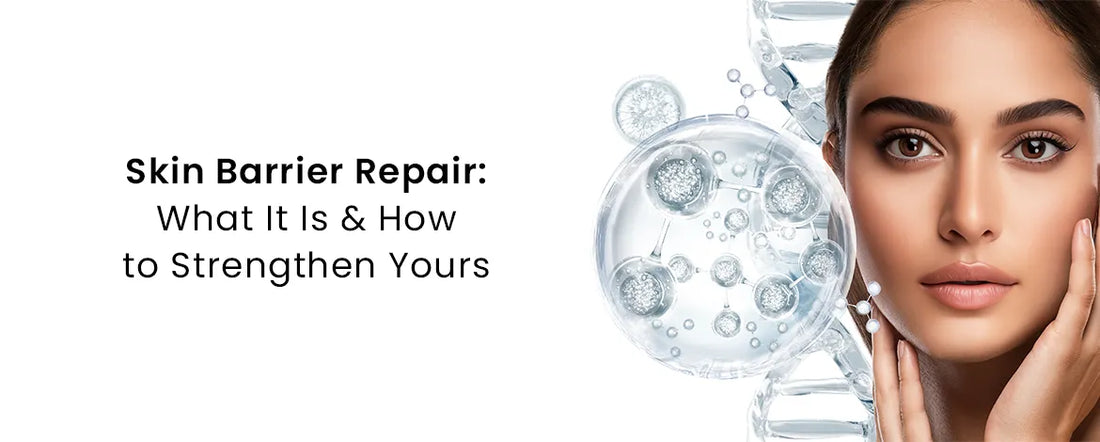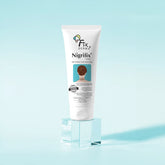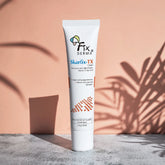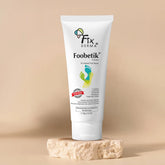Skin Barrier Repair: What It Is & How to Strengthen Yours

Table of Contents
- What Is the Skin Barrier?
- Why Does the Skin Barrier Get Damaged?
- How to Protect the Skin Barrier: Precautions to Take
- Skin Barrier Repair for Different Skin Types
- How to Repair a Damaged Skin Barrier: A Step-by-Step Routine
- Key Ingredients to Look For in Skin Barrier Repair Products
- Top Products for Skin Barrier Repair
- Summary
- FAQs
Having a healthy skin barrier serves as the defensive outer layer of the skin which keeps moisture inside and external threats outside. The protective substances that form the skin barrier face failure when damaged.
The concept of skin barriers repair attracts substantial interest throughout skin care debates because of its importance. The presence of a compromised barrier leads to dry skin along with irritation that might progress to persistent skin problems. This blog explains everything about the skin barrier including its structure function and methods for improving its state.

What Is the Skin Barrier?
The outermost layer of skin called the stratum corneum, functions as the skin barrier which scientists refer to as the stratum corneum. The skin barrier consists of corneocytes which are skin cells and their connection point relies on ceramides with cholesterol and fatty acids as important lipids. The skin barrier functions like a traditional brick wall because its cells represent the bricks while lipids represent the mortar which unites all elements.
Your skin relies heavily on its protective barrier for its defense against outside agents. Through enzymatic mechanisms, the skin barrier retains water for hydration and simultaneously defends against invasive pollutants, bacteria, and skin irritants.
Skin barrier health depends on two main factors: the microbiome which preserves a healthy balance while stopping invading harmful bacteria and the exterior wall of skin cells secured by ceramides and other lipids.

Why Does the Skin Barrier Get Damaged?
The skin barrier is resilient, but it’s not invincible. Here are some common causes of damage:
- The damage from excessive scrubbing together with continued acid use leads to protective skin lipids removal and heightened skin vulnerability.
- Exposure to harsh chemical products that contain sulfates or high alcohol content combined with improper pH levels can cause harm to the protective skin barrier.
- Environmental stressors which include UV rays along with pollution and both wind and dry air will gradually break down your barrier.
- The skin becomes unable to perform self-repair when stress and a lack of sleep disrupt its natural processes. The barrier becomes compromised as a result.
- Food deficiency coupled with inadequate water consumption causes problems for your skin's protective abilities.
- Psoriasis rosacea and eczema create medical conditions that increase skin barrier vulnerability.

How to Protect the Skin Barrier: Precautions to Take
Preventing damage is always easier than repairing it. Here’s how to keep your skin barrier strong:
- Your choice of cleanser should have both a pH balance that matches your skin and it should maintain your natural oil production. Use pH-balanced and milder cleansing products because they offer effective cleaning while protecting your barrier.
- Apply moisturizer with barrier-supporting ceramides fatty acids and cholesterol since these ingredients help replace and strengthen the lipid layer.
- Using retinoids and acids beyond recommended amounts leads to skin damage because of excessive irritation which affects the skin barrier structure. Apply these products only occasionally while completing every use with a moisturizing step.
- Wearing sunscreen with SPF 30+ is a necessity since UV rays present the greatest danger to your skin barrier. Daily sunscreen use is non-negotiable.
- Taking long hot showers causes the skin to become dry and irritated because hot water removes the natural oil from the skin's surface. Take shower breaks that utilize water at room temperature along with short durations.
- Drinking sufficient water and consuming balanced meals will help your skin perform its natural reparative functions.

Skin Barrier Repair for Different Skin Types
Every skin type has unique needs when it comes to barrier repair. Here’s how to tailor your routine:
Dry Skin: The care of dry skin requires using the hydrating moisturizer due to its creamy texture. Your skin needs a moisturizer and you should choose non-foaming cleansers which do not dry your skin. Occlusives, like to retain moisture during the night, consider selecting shea butter or petroleum products.
Oily/Acne-Prone Skin: Opt for lightweight, non-comedogenic hydration, such as niacinamide or hyaluronic acid. Avoid alcohol-heavy products and over-washing.
Sensitive Skin: For sensitive skin, always patch-test new products. You should use products that contain allantoin together with Centella Asiatica and oat extract. It is known as the most effective skin barrier repair cream.
Combination Skin: People with combination skin types need to use balanced products that combine moisturization with skin-calming products, avoiding overloading any one area. Use spot treatments only where necessary.

How to Repair a Damaged Skin Barrier: A Step-by-Step Routine
Morning Routine:
- To repair a damaged skin barrier, you should begin each day with a non-aggressive cleanser free of chemicals that will maintain your skin's natural equilibrium.
- You can use an optional hydrating mist or toner that prepares your skin to receive subsequent products more efficiently.
- The search for barrier-repair serums should focus on products containing ceramides or peptides together with niacinamide because these stabilize your skin's barrier function.
- You should use Fidelia Moisturizing Cream as your moisturizer because it contains both lipids to nourish your skin and humectants to maintain water content.
- Your skin needs defense against ultraviolet rays so you should use a broad-spectrum sunscreen that has an SPF level of 30 or higher.
Night Routine:
- The evening cleansing process should use the same cleaning product as the morning since it removes impurities without causing lipid loss in your skin.
- To enhance overnight hydration, apply serum with hyaluronic acid or panthenol content.
- Use a repair-oriented moisturizer together with a sleeping mask before bed since these products help your skin improve during the night.
- Optional: Facial Oil or Balm- For extra nourishment, layer a facial oil or balm over your moisturizer.

Key Ingredients to Look For in Skin Barrier Repair Products
When repairing your skin barrier, these ingredients are your best allies:
- Ceramides, Fatty Acids, Cholesterol: Replenish the skin’s natural lipid barrier.
- Panthenol (Vitamin B5): Soothes and hydrates while supporting repair.
- Niacinamide (Vitamin B3): Strengthens the barrier and reduces inflammation.
- Hyaluronic Acid and squalane: Provide deep hydration without clogging pores.
- Oat Extract, Aloe Vera: Calm irritation and redness.
These are the major skin barrier repair products that you need to try.
Top Products for Skin Barrier Repair
Here are some highly recommended products to help repair and strengthen your skin barrier:

Durave Barrier Repair Face Moisturizer: Best Moisturizer For Dry Skin
Durave is known as a barrier repair face moisturizer. This moisturizer is known as the most important product for reinstating the skin barrier.
Key Benefits: Repairs and strengthens the skin barrier, hydrates, improves elasticity, soothes sensitive skin.
Ingredients & Their Benefits:
- Probiotics: Balances skin microbiome, reduces inflammation, defends against irritation.
- Ceramide Complex: Strengthens skin barrier, locks in moisture, enhances skin elasticity.
- Mango Butter: Rich in antioxidants and vitamins, deeply hydrates and nourishes skin.
- Peptides: Stimulates collagen production, firms skin, improves texture.

Cleovera Cream for Sensitive Skin
Cleovera Cream is mainly created for sensitive skin, it is completely fragrance-free and hypoallergenic. This cream includes several major calming elements like allantoin and oat extract, which decrease redness along with irritation by strengthening the key skin barrier.
Key Benefits: Soothes post-treatment skin, reduces inflammation, hydrates, smoothens texture.
Ingredients & Their Benefits:
- Aloe Vera: Soothes irritation, reduces pigmentation, hydrates, promotes healing.
- Retistar (Liposomal Retinol): Boosts collagen, reduces wrinkles, improves skin tone and texture.
- Wheat Germ Oil: High in Vitamin E, nourishes skin, prevents oxidative damage, balances sebum.
- Vitamin E: Powerful antioxidant, repairs UV damage, slows visible signs of aging.

Fidelia Moisturizing Cream
Hydrating moisturizer, Fidelia is a lightweight moisturizing cream that is apt for oily skin and combination skin types. It is associated with niacinamide and hyaluronic acid, which help to increase skin hydration and repair the skin barrier by not clogging pores.
Key Benefits: Moisturizes dry skin, restores pH, improves texture, non-greasy formula.
Ingredients & Their Benefits:
- Allantoin: Soothes and calms dry, irritated skin; ideal for sensitive skin types.
- Urea: Exfoliates dead skin cells, retains moisture, softens hardened skin.
- Lactic Acid: Gently exfoliates, stimulates collagen, hydrates deeply.
- Aloe Vera: Hydrates, soothes inflammation, and are rich in antioxidants.
- Almond Oil: Treats eczema and psoriasis, anti-inflammatory, and softens rough skin.
To get more details on the products, visit Fixderma’s Skin Barrier Repair Collection.
Summary
The basis for solid skin barrier maintenance results in dampened skin along with durable skin texture and radiant skin appearance. A proper treatment helps to restore a damaged barrier even though prevention remains the primary strategy. Recovery of your skin's natural defenses requires both regular applications and moisturizing skincare products that remain gentle on your skin.
FAQs
Q: How do I know if my skin barrier is damaged?
A: Look for signs like dryness, redness, flakiness, sensitivity, or a feeling of tightness.
Q: How long does it take to repair the skin barrier?
A: With consistent care, you may see improvements in 2-4 weeks, but full repair can take longer depending on the severity of the damage.
Q: Can I use retinol or acids while repairing my skin barrier?
A: It’s best to avoid strong activities until your barrier is fully healed to prevent further irritation.
Q: Can sunscreen help repair the skin barrier?
A: Sunscreen protects your skin from UV damage, which can weaken the barrier, so it’s an essential part of any repair routine.
Q: Should I stop my entire skincare routine if my skin barrier is damaged?
A: Simplify your routine by focusing on gentle, hydrating products and avoiding harsh activities until your barrier is repaired.
Q: What’s the best way to hydrate my skin while repairing the barrier?
A: Use humectants like hyaluronic acid and follow up with a lipid-rich moisturizer to lock in hydration.
Q: Can diet affect my skin barrier health?
A: Yes, a diet rich in healthy fats, vitamins, and antioxidants can support skin repair and overall barrier function.
Q: Is it normal for my skin to feel worse before it gets better during repair?
A: Sometimes, your skin may purge or feel sensitive as it adjusts to a new routine, but this should improve with time.








